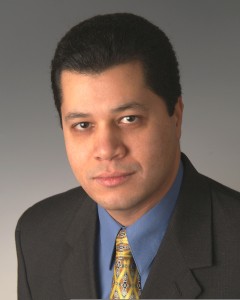 Dr. Wael Zatar, dean of Marshall University’s College of Information Technology and Engineering (CITE), has been appointed to serve as a member of the Transportation Research Board (TRB) National Expert Panel on “Use of Fiber Reinforced Polymers in Transportation Infrastructure,” which is being conducted as one of the National Cooperative Highway Research Program (NCHRP) Synthesis Studies.
Dr. Wael Zatar, dean of Marshall University’s College of Information Technology and Engineering (CITE), has been appointed to serve as a member of the Transportation Research Board (TRB) National Expert Panel on “Use of Fiber Reinforced Polymers in Transportation Infrastructure,” which is being conducted as one of the National Cooperative Highway Research Program (NCHRP) Synthesis Studies.
The main objective of projects under this program is to synthesize existing information on a topic of relevance to highway objectives. Synthesis publications have proven to be useful and authoritative reports on highway problems and practices. As a member of the expert panel, Zatar is expected to participate in regular meetings to discuss the topic and refine the scope of the project, suggest sources of information, and identify and discuss potential topic consultants.
The panel will advise on the format and content of the synthesis report and review the draft documents.
Neil J. Pedersen, executive director of the Transportation Research Board’s, informed Zatar by letter of his appointment.
The TRB is a division of the National Research Council (NRC), a private, nonprofit institution that provides expertise in science and technology to the government, the public, and the scientific and engineering communities.
The NRC is jointly administered by the National Academy of Sciences, the National Academy of Engineering and the Institute of Medicine. Members of NRC technical committees serve as individuals, not as representatives of the organizations by which they are employed or of which they may be members.
The expert panel provides a forum for gathering, synthesizing and disseminating information on research and development and on the design, fabrication, serviceability, inspection and repair of fiber-reinforced polymer transportation structures. Activities of this panel assist developing an awareness of the potential impacts of using composites for a wide range of structural applications and provide information for development and conduct of academic courses on composites for civil engineers.
The panel will focus its work on evaluating the use of fiber reinforced polymers in highway infrastructure as they relate to: how State Departments of Transportation (DOTs) are using fiber-reinforced polymer and summary of use by application, whether the use is experimental or an institutionalized standard practice, lessons learned by state DOTs, specifications, design guidelines, methods of procurement/contracting, long-term durability, performance evaluation and qualification testing, use of the fiber reinforced polymers in repair and retrofit applications versus new construction projects, cost considerations and how cost impacts the decision, challenges to implementation and how fiber-reinforced polymers are incorporated into life-cycle cost analysis.
“I am fascinated with this very prestigious appointment and with the fact that I have been selected to serve the civil and the structural engineering community at this very high level. It is an absolute honor to assume this role, to serve at this capacity and to be one of very few panelists coming from academia from all over the globe,” Zatar said. “As an expert panelist I would provide guidance, with my panel colleagues, and review reports aimed at documenting the current state of the practice in the use of fiber-reinforced polymer in highway infrastructure. The synthesis will identify fiber-reinforced polymer applications, barriers to more widespread use, current research, and research needs.”
Zatar, who calls himself “a very proud Marshall University employee,” will be the first from the state of West Virginia to serve in such a national role in the field of composites’ application to transportation infrastructure.
“My role on the panel would allow me to continue acquiring the latest knowledge in the field and be able to transfer and implement the state-of-the-art knowledge and the state-of-the-practice for repair technologies, thus benefitting the infrastructure system in West Virginia and the United States,” Zatar added.
Zatar also serves as the chairman of the National Committee on Structural Fiber Reinforced Polymers of the Transportation Research Board of the National Academies. The committee is among the largest and most prestigious national – and international – committees on the subject of Structural Fiber Reinforced Polymers. Zatar’s initial service is for three years, from 2015 to 2018, although his service is expected to be extended for another three years to 2021.